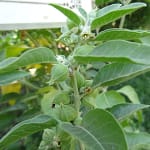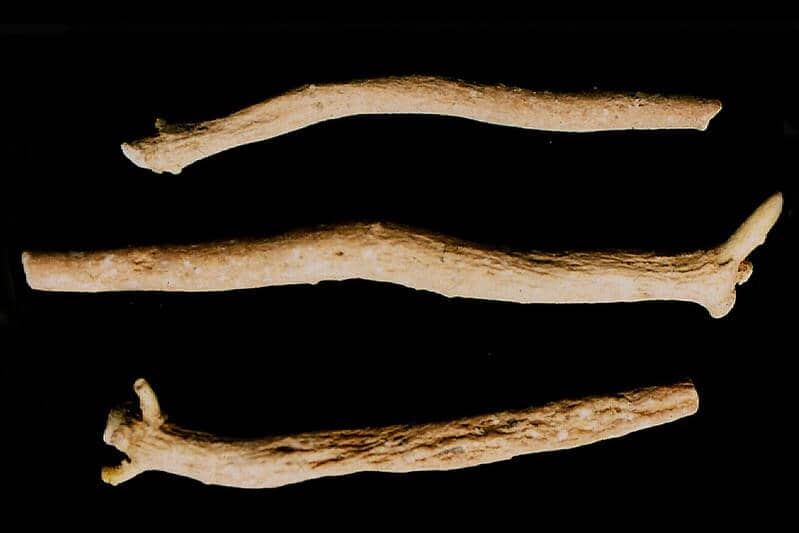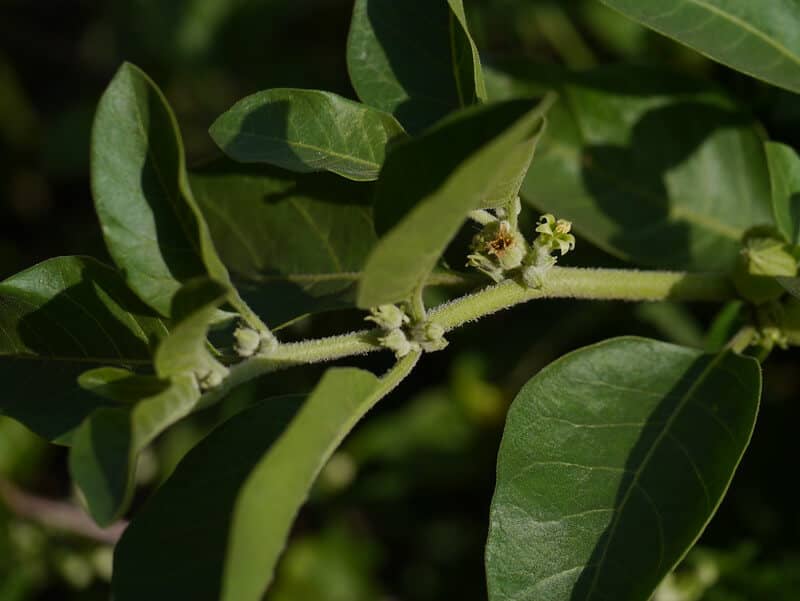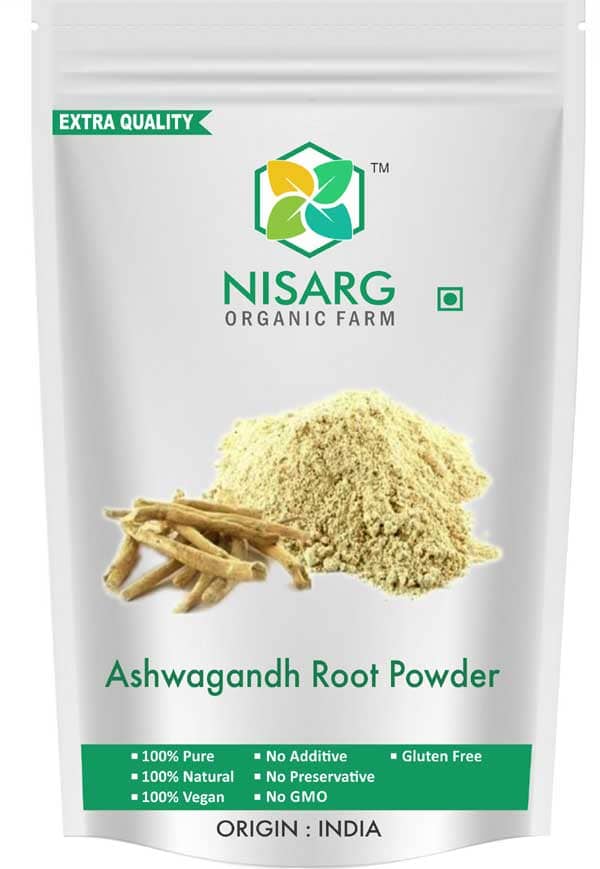Ashwagandha is one of the most well-known herbs in the traditional Ayurvedic medicine system. Known as Ashwagandha in Sanskrit, its name literally means the horse’s (Ashwa) smell (gandha). This name is attributed to its roots which smell like a horse’s urine. It is also said that the herb has the ability to provide vitality like that of a horse. Ashwagandha has been given the botanical name Withania somnifera and is known as Indian ginseng in English. In Hindi, the herb is called Asgandh.
Anatomy And Distribution
Ashwagandha grows as a short perennial shrub, growing up to the height of 35 to 75 cm. The flowers are small, green yellowish in colour and grow in clusters. The leaves are dull green in colour. Its shrub bears red berry-like fruits. The roots which are one of the most important parts of the plant are long and tuberous.
The shrub generally grows in a dry climate with stony soil. Grown throughout India, it can also be found in Yemen, China and many parts of the Indian sub-continent.

Ashwagandha: Uses And Properties
Being one of the most potent herbs, it is used in all the traditional medicine systems including Ayurveda, Unani and Siddha. It is helpful in:
- It is used for curing many conditions related to poor mental health like bipolar disorder, anxiety or attention deficit hyperactivity disorder (ADHD)
- Ashwagandha has been traditionally used for improving strength, vitality, immunity and even libido.
- It is extremely useful if a person is suffering from heart problems.
The herb has the following properties:
- Anti-inflammatory
- Anti anaemic
- Anti-tumour
- Antidepressant
- Antioxidant
- Analgesic
- Phytoestrogen
- Tonic
- Immunomodulator
- Nervine
- Mild sedative
- Analgesic
- Reproductive Tonic
- Aphrodisiac
- Adaptogenic
According to Ayurveda, Ashwagandha’s health benefits include:
- Balya – helps in improving strength
- Vranaan hanta – can improve the rate of wound healing
- Vrushya – is an aphrodisiac
- Rasayani – provides vitality and increases life expectancy
- Vishahara – is antitoxin
- Shwasahara – can help cure respiratory disorders
- Anilam hanta – is useful in nervous system-related disorders
- Shophahara – is anti-inflammatory
Ayurvedic Properties Or Gunadharma
- Physical property (Guna) – light (laghu), unctuous (snigdha)
- Taste (Rasa) – bitter (tikta), pungent (katu), astringent (kashaya)
- Potency (Veerya) – ushna or hot
- Conversion after digestion (Vipaka) – pungent after digestion
- Effect on doshas – balances all the three doshas, especially Vata and Kapha
Charaka in Charaka Samhita classifies the herb as:
- Balya – herbs that help in improving strength, vitality and immunity
- Bhrimaneeya – Herbs that make the body nourished
Ashwagandha Benefits

Helps Fight Anxiety And Stress
All of us go through stress on a daily basis. It might be pressure in the office or money crunch. Coupled with an unhealthy lifestyle, the stress level has increased manifold and has started affecting children and adults alike. Most of us prefer going for benzodiazepine-like lorazepam to lower our stress and anxiety and for the feel-better effect.
However, a study published in journal Phytomedicine shows Ashwagandha consumption too can help lower stress to a significant level and doesn’t come packed with side effects. It normalizes the cortisol levels in the body by controlling the functioning of the adrenal glands.
Since the adrenal gland is quite closely related to the thyroid gland, It also helps in better functioning of the thyroid gland. So next time you are going through a tough time, you know what to choose. Certainly, a good and healthy lifestyle has no substitute; but when looking for drugs, try choosing ones which will cause the least harm.
Helps in maintaining good health of the heart
Consumption of Ashwagandha shows a positive effect on the heart too. And not only this, but it can also help manage diabetes. The speciality of this herb is that it can help manage blood sugar level effectively. When the sugar level in the blood goes high, Ashwagandha lowers it and vice versa.
Thereby, the herb gives an adaptogenic effect. It can also help in managing cholesterol level, high blood pressure and chest pains. These positive effects of Ashwagandha are confirmed by a study published in the International Journal of Ayurveda Research.
For Joint Health
Ashwagandha has anti-inflammatory properties and thereby it is considered useful in the treatment of problems related to joints. It is a good pain reliever and according to the Indian Council of Medical Research, it is a good treatment option for patients suffering from rheumatoid arthritis. Ashwagandha does this by reducing the level of C reactive protein in the body which is responsible for inflammation.
Suggested Remedy: According to Acharya Balakrishna, people suffering from arthritis, inflamed joints or just joint pain can boil the leaves of ashwagandha in water. Add sendha namak or rock salt to this water and use it to foment the affected area. In case some other part of the body is inflamed or swollen, one can apply a medicinal oil on ashwagandha leaves, heat them and tie them on the affected area.
Brain And Memory Boosting
Ashwagandha has been called a medharasayana in Ayurveda. This means that it has a positive effect on memory and cognition. Ashwagandha contains an active ingredient called ‘withanamides’ which help in fighting Alzheimer’s disorder.
In a study carried on about 50 individuals who showed upcoming symptoms of Alzheimer’s disorder were given Ashwagandha and a significant improvement was seen in their symptoms. The alkaloids present in Ashwagandha are quite potent nerve regenerators and thereby Ashwagandha is not only useful in fighting such disorders and improving memory but consumption of Ashwagandha can help improve response time, alertness, concentration and even induce a positive mood.
Suggested Remedy: Ashwagandha can be consumed in combination with Brahmi churna along with milk regularly to improve and enhance cognition and memory.
For Good Reproductive Health: Testosterone Booster
As mentioned earlier, Ashwagandha can help reduce stress by managing the cortisol level in the body and this is the precursor to good reproductive health. This is because if stress in the body increases, the body prefers not to produce reproductive hormones and deal with stress instead. And the calmer one is, the better the reproductive health.
Ashwagandha proves to be equally beneficial for both men and women suffering from low libido. In fact, Ayurveda considers it to be one of the potent aphrodisiac herbs. In the case of men, it increases testosterone levels and is also helpful in curing erectile dysfunction.
According to one of the researches, regular consumption of Ashwagandha for at least three months can help in improving sperm count as well as sperm motility.
Ashwagandha As An Immunity Booster & Weight Gain Supplement
Ashwagandha is not only consumed to cure a specific disorder, but it works as a health tonic and can improve general physical and mental well being to a great extent. It is proven that Ashwagandha can significantly improve the functioning of the heart as well as the lungs along with the energy level of the body. This means improved stamina in all the tasks we perform.
Apart from this, it also has an immunomodulatory effect; that is it is beneficial in improving the functioning of the immune system, thus keeping away common flu and many other diseases. Ashwagandha has an anabolic action due to its capability of increasing the testosterone levels in the body; which means it supports weight gain by improving muscle mass and strength. Thus it is quite useful for those pursuing weight training as Ashwagandha can help heal the damage caused to the muscles quickly and also removes the fatigue caused due to extensive exercise.
According to a study, when children were provided with Ashwagandha mixed in milk regularly, it helped improve haemoglobin and plasma protein level in the body.
Suggested Remedy: For people suffering from cough and cold, Acharya Balakrishna brings out a remedy. Using the root of the Ashwagandha plant, prepare a decoction (kadha) in water and drink it regularly for quick relief.
Ashwagandha For Insomnia
Ashwagandha can also work great as a sleep tonic for people with insomnia. Study shows that the leaves of the plant contain a component known as Triethylene glycol which is responsible for its sleep-inducing activity. It is also great for reducing stress which also results in sound sleep.
Suggested Dosage For Insomnia: One tablet once a day at bedtime should be enough for combating stress, anxiety and insomnia. You can also use 3 to 6 gms of powdered form with milk at bedtime.
Anticancer Activity
Ashwagandha has an antioxidant nature, that is it helps in the destruction of free radicals in the body. Often it is the free radicals which lead to the formation of malignant cancerous tumours. Thus Ashwagandha shows an anti-cancer effect. It also has the ability to slow down the spread of cancer in the body.
According to one of the experiments, when Ashwagandha was tested on mice, it showed approximately 75% reduction in tumour growth.
Anti-Ageing Effect
Ashwagandha, according to Ayurveda gives anti-ageing effects and promotes longevity. This is one obvious effect of Ashwagandha as it is immunomodulatory, anti-stress and antioxidant in nature. It can help remove toxins from the body, keep one’s mood elevated and guard the body against a number of diseases. These properties of Ashwagandha automatically reduce the speed of ageing to a great extent and make one look youthful and energetic.
Ashwagandha Leaves For Weight Loss

Obesity is on a rise all around the globe due to unhealthy food consumption. But what is worse is the remedy used by us for weight loss. We often prefer going for magical tablets that can help us transform from very fat to very thin in just a few days. Yet another ongoing trend is that of following a rigorous diet schedule which might definitely help in weight loss but can lead to a deficiency of essential nutrients in the body.
Ashwagandha can prove to be a useful herb if someone is looking forward to losing weight. As a medicinal herb, it will not cause any unwanted side effects.
Suggested Remedy: Acharya Balakrishna suggests consuming a fresh leaf of the Ashwagandha plant thrice a day with water. Following this remedy with a healthy diet can help one reach their desired weight. It should be noted that dry leaves will not have the same effect.
Ashwagandha Dosage: How To Take Ashwagandha?
The general dose of Ashwagandha can vary from 250 to 500 mg per day but it mostly depends upon the disorder for which this herb is being taken.
How to take ashwagandha to increase height?
Ashwagandha tablets can be taken twice a day for 2 to 3 months. It should be noted that it will only help increase height if the person is less than 25 years of age.
Easy DIY Ashwagandha Tea Recipe
Drinking this Ashwagandha tea can help enhance vitality and boost energy levels.
How to make Ashwagandha tea?
- Boil Ashwagandha root powder in water. The quantity can be varied according to how much tea you’re preparing.
- One can add honey, ginger or any other supplementary material if they wish to.
- Strain it and the tea is ready!
Ashwagandha: Side Effects And Precautions
Ashwagandha as a herb is considered possibly safe. However certain precaution should always be maintained:
- Pregnant and lactating women must avoid consuming ashwagandha as its safety information for them is not completely known.
- Since Ashwagandha has the ability to lower the level of blood sugar, diabetes patients must not consume it in combination with their usual drugs and must always consult their doctor first. People planning to undergo surgery must stop consuming Ashwagandha at least two weeks before the due date.
- Ashwagandha increases the activity of the immune system and hence people suffering from autoimmune disorders must remain cautious.
- All the people who are already consuming antibiotics, especially related to thyroid, blood pressure etc should always consult a medical practitioner before consuming Ashwagandha.
- People with stomach ulcers must refrain from consuming this herb as it can cause more irritation.
- Ashwagandha works as a sedative and hence can make one feel sleepy.
Ashwagandha Price & Where To Buy?
Did you find this post useful? Would you like to get back to it later? Save THIS PIN below to your Pinterest Natural Living or Ayurveda board!


